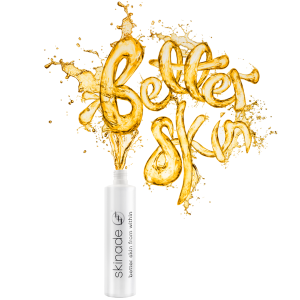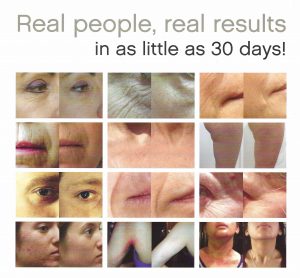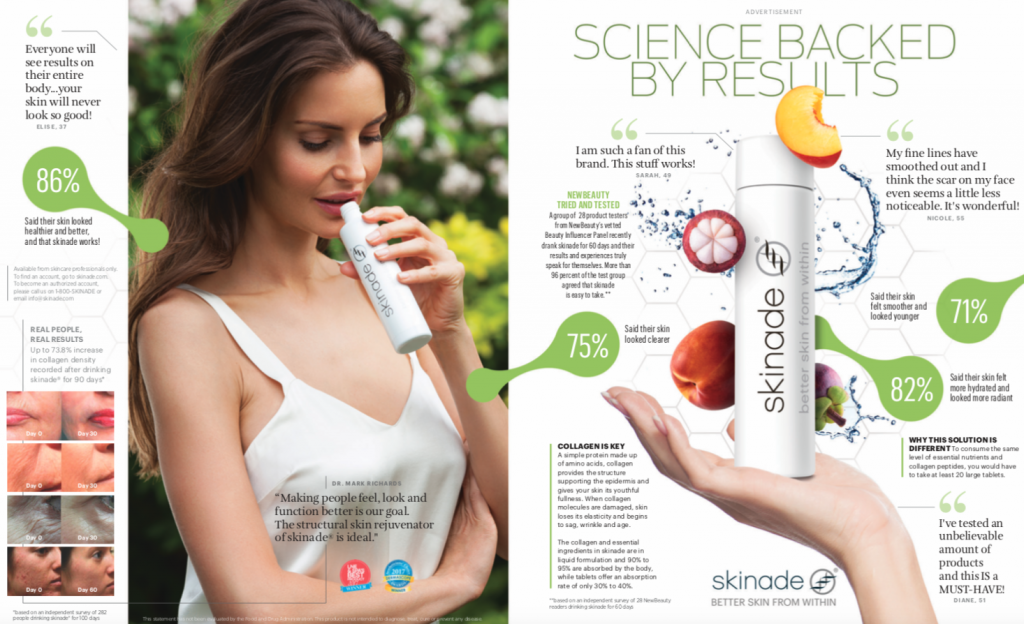4 Reasons Collagen Declines + How We Can Fix It
4 Reasons Collagen Declines + How We Can Fix It
Collagen is an essential component of our skin. It’s what gives our skin that youthful fullness & glow. The more collagen you have, the healthier, more elastic and supple your skin is and the more youthful it appears.
That being said, we lose 1.5% of the collagen in our skin each year after the age of 20. As collagen is damaged and the overall amount of collagen in the body declines, our skin’s elasticity declines, fine lines start to appear, skin begins to sag, wrinkle and age.
The number one cause of the appearance of skin aging is loss of collagen. Collagen makes up 30% of the body’s protein and 70% of the skin’s protein.
So how and why does collagen decline & how can we fix it? Keep reading…
Here are some of the top factors that increase the rate of collagen decline that we can control:
- UV Damage – There’s a scientifically proven link between UV damage and loss of collagen. One study exposed collagen to UV light and found that there was a “significant decrease” in collagen structure afterward. UV rays damage collagen in multiple ways such as DNA damage to fibroblasts (the cells that make collagen) as well as the production of free radicals that can damage collagen directly.
- Smoking – By now, we’re all aware that smoking detrimental to our health, causes premature aging, and leads to us wrinkling before our time. One study on twins found that those who smoked had more wrinkles, crow’s feet, and facial lines than their non-smoking counterparts.
- One of the main reasons for this is that it directly damages our collagen. In fact, smoking is one of the biggest reasons for collagen damage. “Smoking decreases the amount of oxygen delivered to tissues. Therefore, tissue cannot regenerate and is more likely to become damaged and die,” says board-certified dermatologist Gary Goldenberg, M.D., assistant clinical professor of dermatology at the Icahn School of Medicine at Mount Sinai in New York.
- Diet – As inflammation is a dangerous enemy of any of our bodies tissue (including the fibroblasts (the cells that make collagen), diets that cause inflammation to contribute to loss of collagen. Inflammatory diets are diets that often include foods that are high simple carbohydrates (junk food), sugar, and processed meats (i.e. deli meat). Diets high in these foods activate the immune system and promote an inflammatory effect throughout the body. “This may interfere with wound healing, including healing of environmentally damaged skin cells,” says board-certified dermatologist Joshua Zeichner, M.D. Sugar, specifically, can be tough on collagen. “High sugar levels can lead to hardening and fragmentation of collagen, weakening the skin foundation, and promoting premature skin aging,” Zeichner says.
- Stress – Research shows that stress can spark inflammation and, again, that can lower your ability to naturally produce collagen. Stress also causes an increase in hormones like cortisol, which research has found can decrease the production of collagen. Therefore, when we are in high-stress states, we produce less collagen, and our body uses more of the collagen we have left.
Here’s what we can’t control:
- Age Although the exact age we start losing collagen varies for everyone, on average, we lose 1.5% of the collagen in our skin each year after the age of 20. This loss results in skin aging, wrinkles, fine lines, dry skin, blemishes, and thinning skin. When we’re young, our bodies naturally produce more collagen than we break down. The more collagen you have, the healthier, more elastic and supple your skin is and the more youthful it appears. As we age, the balance between production and degradation gets out of whack and we start losing collagen faster than we can produce it.
- Genetics Genetics plays an important role in determining how much collagen your body produces and uses. Thus, if your parents and grandparents had youthful-looking skin as they aged, odds are high that your skin will be similar as you do. Because we don’t have control over this, it’s important to focus on the things we can control: UV protection, diet, and stress.
Here’s how we can fix it:
1. Change our bad lifestyle choices to good lifestyle choices:
Wear SPF, Quit (or at least cut back) Smoking, and Eat Consciously
Protecting our skin from the sun is one of the MOST important anti-aging parts of a skincare routine. Since UV exposure is a direct hit to your skin’s collagen, using a good SPF regularly will help fight off the rays and combat the decline of collagen.
We have our tried-and-true, in our opinion and according to various scientific studies, best SPF on the market, available to you at BeautySmart Medical Spa.
Quit or cut back smoking. We know it’s hard, but your skin and body will thank you!
Eat consciously. Our diets are crucial to our overall health. Think about the food going into your body before you eat it.
Processed foods high in simple carbs and sugars, like chips, candy, pastries, should be enjoyed but kept to a minimum.
Eat more veggies! Eat more fruit! Enjoy good quality fish and keep red meat to a minimum.
A healthy diet provides the body with the nutrients it needs for optimal functioning.
2. Eat more antioxidants – VITAMIN C is your friend!
Antioxidants fight free radical damage from the environment. Vitamin C is the heavy hitter here. Antioxidants can be taken internally or applied topically to the skin, and combat collagen breakdown by reducing the amount of free radicals in the skin.
Vitamin C, in particular, has been found in research to support the production of collagen and to help manage its stability. It promotes fibroblast proliferation. It’s a necessary component to the production of healthy collagen; without it, it’s a struggle for new collagen cannot be accurately made produced.
Vitamin C is one of our favorite parts of ALL of our daily skincare routines for healthy, glowing skin.
When choosing a Vitamin C topical serum, make sure you get a high grade and quality product. Our BEAUTYSMART MD SKINCARE Vitamin C Serum is our favorite (and not just because it ours). Our serum effectively penetrates the skin to deliver a megadose of potent antioxidants and Green Tea Extracts to help combat the effects of free radicals, the aging process, sun damage and pollution, and rebuilds the lipid barrier, to increase skin smoothness and suppleness. PLUS! It’s cruelty-free!
3. Take a collagen supplement.
Since we can’t stop the decline of collagen production, we can take high quality supplements to help increase and promote the collagen levels we have left.
Collagen supplements, more specifically, hydrolyzed collagen supplements, made of collagen peptides, which are short chains of amino acids that make up collagen but are small enough to be absorbed easily by your body, have been shown to promote collagen production.
Our favorite collagen supplement? SKINADE™

Skinade’s patented formula utilizes high-grade collagen and essential micronutrients to help your body rebuild and strengthen its collagen matrix.
The hydrolyzed marine collagen peptides in skinade have low molecular weight. The collagen fibers formed, strengthen the collagen matrix in the dermis.
Skinade™ improves skin elasticity by increasing the density of fibroblasts (the cells responsible for rebuilding connective tissue), improves skin hydration and reduces fine lines and wrinkles.
Drinking skinade also stimulates the body’s own natural collagen production. When the body senses collagen in the bloodstream, it stimulates the proliferation of fibroblasts reinforcing the collagen matrix and playing a crucial role in wound healing.
This dual action makes skinade a highly effective skincare solution. Consumed on a daily basis, it effectively returns your body to a younger state of collagen production, resulting in a visibly more youthful appearance.
Taken daily for up to 12 weeks, placebo-controlled double-blind studies on 186 participants showed that the collagen peptides in skinade:
- Increase skin hydration levels
- Increase skin smoothness by reducing the number of fine lines
- Prevent the formation of deep wrinkles
- Improve skin suppleness

Skinade™ does more than promote your body’s natural production; it also helps temper some of the causes of collagen’s decline, like inflammation. Skinade™ contains MSM – a naturally occurring form of organic Sulphur found in all living organisms, that helps collagen and keratin formation, improves skin elasticity and inhibits cross-linking of collagen cells, a major cause of skin aging.
It also has:
- Vitamin C
- Vitamin B complex – Riboflavin (vitamin B2), niacin (vitamin B3) and biotin contribute to the maintenance of normal skin health. Vitamin B2 also contributes to the protection of cells from oxidative stress. Folic acid and vitamin B12 play a role in the process of cell division. Our vitamin-B complex promotes more uniform, clearer, glowing and radiant skin.
- Omegas 3 & 6
- L-lysine– an essential amino acid that is key to rebuilding the collagen matrix at cellular level.
- And Biotin– to promote healthy skin, hair, and nails

Skinade is available at our office at 94 S Federal Highway, Boca Raton, FL 33432, or we can drop-ship it directly to your doorstep!
Call or text us anytime at 561-990-7294
♥️ The BeautySmart Team
*If you are pregnant, breastfeeding, or taking medications, consult with your doctor before starting a supplement routine. It is always optimal to consult with a health care provider when considering what supplements are right for you.
* Clinical trial results (YNTKK-2008-4144 and 2008-A00654-51)
* National Institute of Health: Public Access Author Manuscript, Arch Dermatol. 17 June 2010
* Baroni et al, 2012
* Clinical trial results (YNTKK-2008-4144 and 2008-A00654-51)
*Miller, Korin, and Keira Barr. “Collagen Starts Declining In Your 20s + 5 Other Reasons You Lose It.” Mindbodygreen, Mindbodygreen, 10 Mar. 2020, www.mindbodygreen.com/articles/the-reasons-collagen-declines-how-to-support-it-naturally

